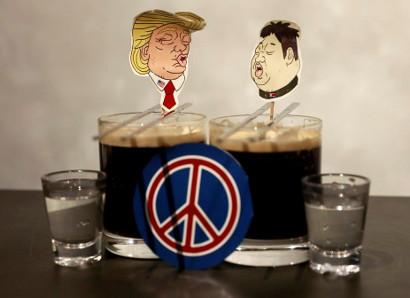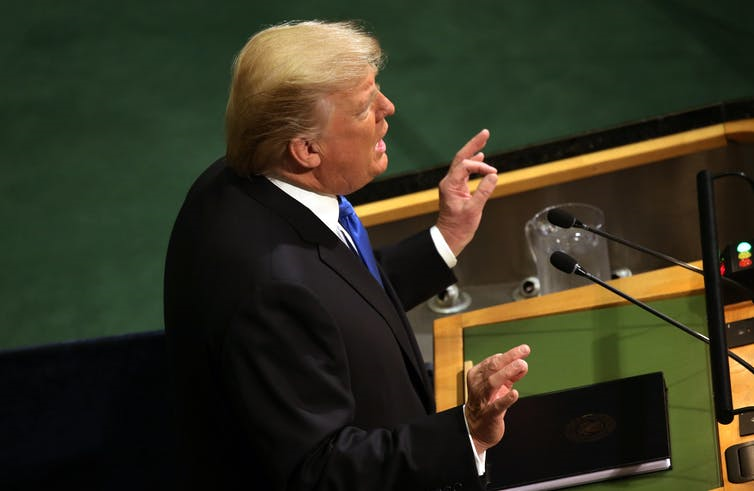Why Donald Trump desperately needs interpreters for his ‘chat’ with Kim

After months of back-and-forth insults and compliments the US president, Donald Trump, is finally going to meet with North Korean leader Kim Jong-un in a historic summit in Singapore. It has been hinted that this could be the first of several such meetings, since defusing North Korea’s nuclear strategy will probably take some time.
The volatile and unpredictable nature of both leaders has many onlookers worrying about whether this high-stakes summit will run smoothly. But Trump and Kim aren’t the only people at the table. Also involved will be an underrated team of players who are bound to influence the tenor of the negotiations – the interpreters.
The critical role that interpreters play in political encounters is often overlooked. They are usually considered accessories rather than participants, but in fact, they have tremendous responsibilities in historic talks such as these. There are fears, however, that Trump might suddenly decide to speak to Kim without an interpreter present, as he reportedly did with Russian president Vladimir Putin at the 2017 G20 summit.
Although he has been briefed continuously in recent weeks, Trump’s critics worry that he is not well prepared for the talks and may decide to improvise and to make “seat-of-the-pants” decisions. And while there are plenty of “third rails” for him to avoid, foregoing the interpreter would be a big mistake for at least three reasons.
Understanding Trump
Much has already been written on the US president’s habitual mangling of the English language. Even language experts have struggled with his strange jargon, jumbled syntax, leaps of logic, and outright vulgarity. So it would be unreasonable to expect that Kim Jong-un would fare any better when confronted with Trump’s unique way of expressing himself.
While the extent of Kim’s knowledge of English is unclear, it is thought that he is able to speak it well enough to “chat”– whatever that means. In Trump world, this may be enough encouragement to forego the interpreters – but their diplomatic skills are crucially important for diffusing dangerous situations, particularly in face-to-face dialogue.

Put that in your headphones and translate it. EPA/Peter Foley
If the negotiations turn sour, or Trump suddenly decides to call North Korea a “shithole”, as he has done for other countries in the past, Kim might not take kindly to it (to put it mildly), and the world might be thankful if the interpreter decided to use the tamer version that Taiwan’s Central News Agency has previously opted for: “countries where birds don’t lay eggs”.
Translation scholar Jeremy Munday argues that translators and interpreters are able to intervene where original discourse is particularly harsh or ambiguous – and they often do. As an example, he points to the English translation of a speech by Venezuelan president Hugo Chávez to the United Nations General Assembly in New York in 2006, where the reference to the US president as “señor dictador imperialista” (Mr imperialist dictator) was softened in the translation to read “dear world dictator”.
Filling in the gaps
It is widely reported that Trump generally does not read briefs and that those he does read have generally been “dumbed down, denuded of nuance, and larded with maps and pictures because he can’t be bothered to read a lot of words”. His approach to the forthcoming summit doesn’t seem to be very different.
Just days before the negotiations, he said that he didn’t think he had to prepare very much, as it’s all about attitude anyway. Worryingly, Trump trusts his gut over his briefing notes – and his doubters and critics worry he could be outsmarted in negotiations.
His propensity for recklessness combined with his ignorance could land him in hot water if he decided not to use an interpreter. Indeed, interpreters use their knowledge and subject matter expertise to fill in the gaps. As professional diplomatic interpreter Harry Obst notes: interpreters travelling with the president get to see his talking points and 80-200 page briefing book. They will study it carefully and should be able to communicate the nuances that escape Trump.
For the record
A climate of paranoia hangs over any diplomacy with North Korea, and spoken conversations are particularly sensitive. During previous meetings between US secretary of state Mike Pompeo and North Korean leaders, and CIA agent Andrew Kim apparently used his Korean language skills to make sure that the North Korean interpreters were conveying his messages accurately. And, with US officials expecting Chinese intelligence to spy on discussions at the June 12 meeting, it seems vital that meetings are recorded as accurately as possible to mitigate against any misinformation or misapprehension.
If Trump insists on a one-on-one with Kim Jong-un, he’ll need an American interpreter there to produce this record. Indeed, Obst argues that the interpreter’s notes are the only way to guarantee that an official written record of the meeting is produced for the US National Archives and for the secretary of state. After all, the North Korean record of such a meeting might present quite a different version of events.
 It is vitally important that Trump does not shut out his interpreters. Interpreters are much more than conduits for conversations between other individuals, and they are crucial for keeping Trump out of diplomatic trouble. But since the president reportedly “wants to go big or go home”, it’s fair to say that we should expect the unexpected.
It is vitally important that Trump does not shut out his interpreters. Interpreters are much more than conduits for conversations between other individuals, and they are crucial for keeping Trump out of diplomatic trouble. But since the president reportedly “wants to go big or go home”, it’s fair to say that we should expect the unexpected.
Severine E Hubscher-Davidson, Head of Translation, The Open University.
This article was originally published on The Conversation. Read the original article.
Contact our news team
For all out of hours enquiries, please telephone +44 (0)7901 515891
Contact detailsNews & articles

OU researchers lead international advances in planetary protection
Open University researchers are leading international advances in planetary protection, helping ensure that space exploration is safe, sustainable, and scientifically rigorous.